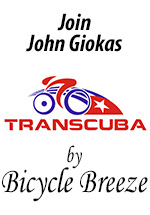June 18/14 15:12 pm - Review: Shadows on the Road by Michael Barry
Posted by Editor on 06/18/14
Toronto-born Michael Barry has just published his third book, Shadows on the Road, a recounting of his career as a pro road rider with US Postal, Discovery, Telekom, HTC-Columbia and Team Sky. Barry retired at the end of 2012, before the release of the US Anti-doping Agency (USADA) Reasoned Decision that stripped Lance Armstrong of his Tour de France titles, and where Barry was named as a rider who admitted to doping. Subsequently, Barry issued a statement admitting to doping for part of his career.
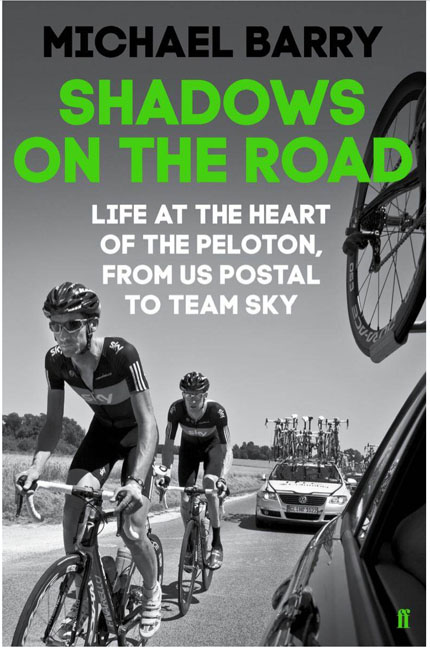
Following his admission, Barry refused interview requests from us and everyone else (with the exception of one short Q&A with the magazine Toronto Life). This book is, I assume, his effort to explain why he did what he did.
There has been a series of books come out over the past few years from disgraced dopers, all purporting to explain and justify the reasons why the individual cheated and lied, right up until the moment they were caught and basically forced to confess. We have reviewed most of them and, to be honest, they are full of whiny rationalizations and self-pity.
I'll be honest; I was pretty angry with Michael - not as much about the doping as the lying, setting himself up as clean and honest domestique, and the way he followed what has become the standard pattern of issuing a brief statement and then laying low, waiting for the furor to die down, instead of facing the music. I wrote an editorial after Ryder Hesjedal did the same thing, blasting him and Barry [see Apologizing is More Than Just Saying You Are Sorry].
The book isn't being sold in North America at this time; it has been published by a smaller UK-based publisher, Faber and Faber. We requested a copy from them, they said they would send one - which never arrived - so on one of my regular trips to Europe to cover events I had a UK-based friend pick up a copy there for me.
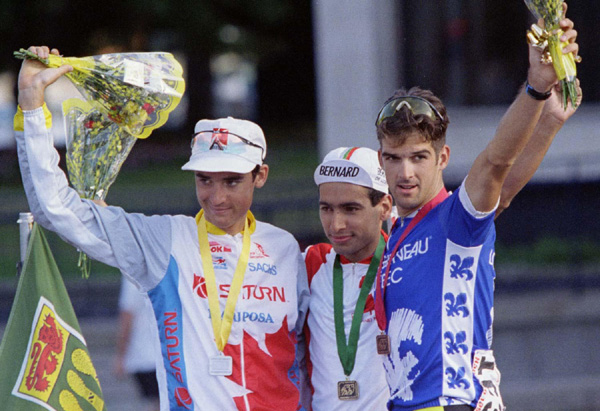
Barry on the podium for the senior men's road race at the 1995 Canadian Cycling Championships in Hamilton, Ontario
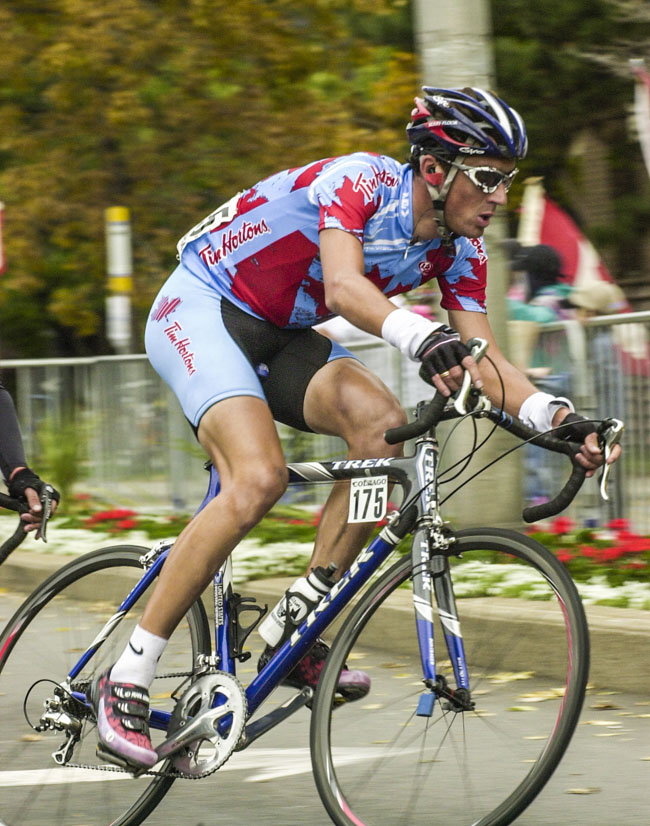
At the 2003 Road World Championships in Hamilton ON, where he placed 7th
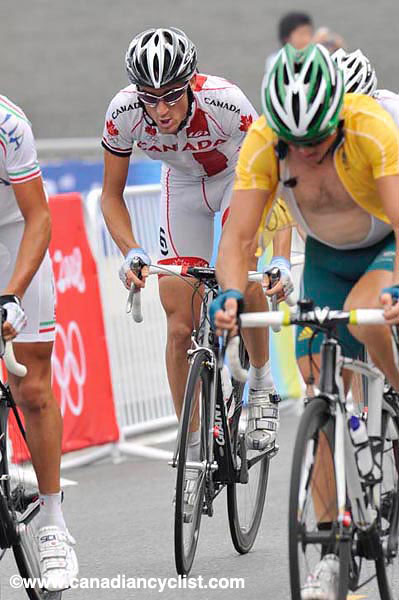
At the 2008 Beijing Olympics where he finished 9th
Michael Barry can write, and this book is no exception. For a number of years he has penned articles for prestigious publications like the New York Times. He clearly has a love of the sport, and has many fans of his somewhat romanticized view of the hard and punishing life of a professional cyclist, which they can live vicariously through Michael's descriptions.
In my opinion, Shadows on the Road is probably the first book about the life of a pro road cyclist since Paul Kimmage's seminal A Rough Road that actually provides an honest accounting of the pressures a rider comes under to dope.
Barry opens with the moment USADA contacted him, and he knew that his cheating was going to come out in public. From there, he switches back and forth between his start as a young aspiring cyclist back in Toronto, the struggles to make it to the pro ranks, and his years as a pro. He clearly loved -and still loves - the sport and the life.
Barry is trying to stitch together for the reader an explanation of his passion and excitement of the sport, and how it leads to a rider becoming willing to accept the dark side of pro cycling - the doping, the almost indentured servitude of riders, the cynicism, the willingness to endure mental and physical conditions that most of us would walk away from.
The other confessional books I have read tend to position everything so that the rider is a victim, helpless in the face of an amoral system. This conveniently leaves out the fact that the athlete does ultimately have a choice, and that some choose to leave, speak out and/or forego the pro European circuit, and that some choose to cheat, and then lie about it, reaping rewards both monetary and in status.
Barry admits that he is one of these latter athletes, allowing himself to be seen as a clean role model, and then perpetuating the lie by denying Floyd Landis' allegations that Barry had doped.
"In 2010, while staying in a coastal hotel in Italy and competing at the Giro d'Italia, my secrets and lies became public. It was then that I wrongly tried to bury them deeper..."
He talks about the self-justification as to why he should deny the allegations, rationalizing that the team (Sky) could lose its sponsors, affecting the livelihood of dozens of staff and riders, including himself.
"If I denied having doped, I would still have a job, and so would my teammates and everyone else. That's how I rationalised my decision ... to keep my job, I would have to say Floyd was lying."
He talks about the anxiety and the guilt, and the fact that he did nothing to alleviate the situation.
"I shouldn't have lied. I shouldn't have called Floyd a liar when he had finally told the truth about the team and us. But I did."
However, I recognize that it took courage to write this honest an account. Paul Kimmage, who has become a crusader against doping, did not have nice things to say about the book, suggesting that Barry could have gone much further with revealing facts about doping and other dopers. This is somewhat ironic, since Kimmage himself didn't name any names in his book, carefully avoiding talking about the big stars he started his cycling career with. Barry also discusses practices that, while legal in the sport, are clearly unethical, such as the use of Tramadol.
He talks about his beliefs on how cycling should deal with its problems, "A zero-tolerance policy for past offences does nothing but force people to hide their errors. The alternative simply raises too many unpleasant consequences. This is counterproductive. The only way to change the culture is to talk about it, to make amends and to rebuild. If we continue to hide, the cycle of drug use will continue."
I only partially agree with this argument - there are, to be sure, many cases where rehabilitation should be an option. However, there are also some truly amoral individuals that are purely in it for profit and should be removed completely.
I regard Shadows on the Road with mixed feelings. I'm still angry with Michael; I believe he should have come clean earlier, when it could have had a much greater impact. I also can't drop the suspicion that this is part of a public relations campaign to rehabilitate his image.
Having said that ... this is an important account of the state of our sport. It shows that, while cheating is wrong, effective solutions are more complicated than just imposing harsh penalties. Anyone who is serious about improving cycling would benefit from reading Shadows on the Road.
So, while I am still angry, I have regained a measure of respect for Michael Barry. Some of you, for whom the issue is completely black and white, will likely disagree; that is your prerogative. Hopefully, Shadows on the Road will become available over here at some point, and you can make up your own mind.
Shadows on the Road published by Faber and Faber
ISBN 978-0-571-29771-9
| Return to Canadian Cyclist homepage | Back to Top |


